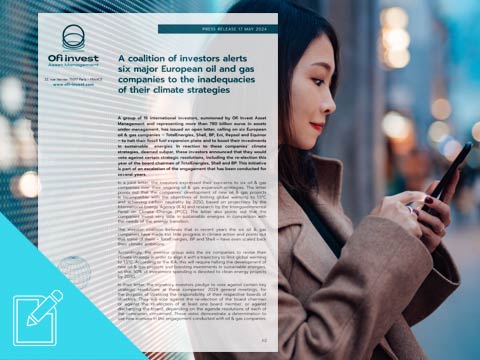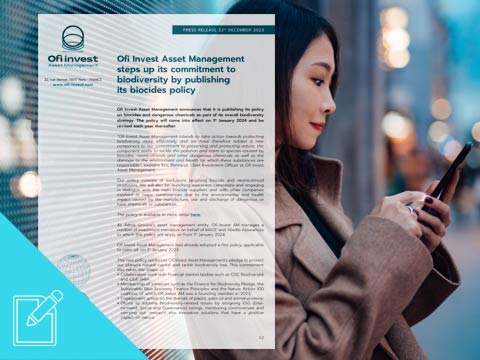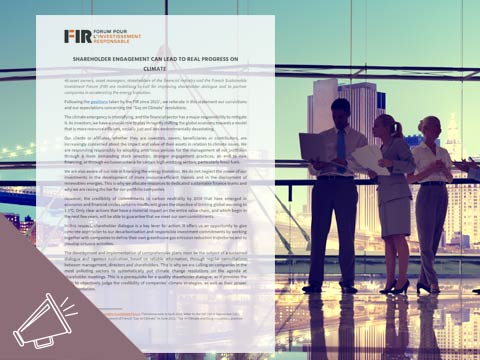Responsible Finance
At Ofi Invest Asset Management, responsible investment has long been enshrined in our values. We are an independent and engaged actor that stands up for a fair balance between the financial ecosystem’s various stakeholders.
Driven by our determination to take action for a fairer world that is more respectful of the planet and mankind, we don’t hesitate to speak out in public, particularly at general meetings of companies in which we are invested. We express this commitment at all levels of our organisation, from our management processes to the bespoke services that we provide to our clients.
Our governance practices, our sector- and norms-based exclusion policies, our incorporation of environmental, social and governance criteria in our management processes, our engagement approach with companies, our capacities to integrate sustainable policies tailored to our clients… all this is proof of our responsible investor approach.

Our ambition is to finance and support our world’s major transitions and to support companies in moving towards more sustainable practices. 
Our ESG research teams

Luisa FLOREZ
Director of Research in Responsible Finance

Valérie DEMEURE
Director of ESG Analysis

Lionel HEURTIN
ESG Analyst (utilities, chemistry, real estate)

Sining ZHANG
ESG Analyst (industry, transport)

Lucie TRACA
ESG Analyst (energy, materials)

Alice Mary MEGGS
ESG Analyst (banking, insurance, finance)

Pauline PAPILLON
ESG Analyst (health, business services)

Jérôme TENDEAU
ESG Analyst (tech, telecom, media)

Guillaume CHECRI
Green Bonds Analyst

Léa BOZZI
Head of Engagement

Etienne PONNELLE
Head of Vote

Yann FERRAT
Director of ESG Quantitative Modeling and Solutions

Anastasiia KASHTANOVA
ESG Quantitative Modelling

Benoît TANGUY
ESG Quantitative Modelling

Camille PONS CABRITA
ESG Solutions

Tom RENAUX
ESG Solutions
Our responsible
investor practices
We have several ways of supporting change.
PROMOTING GOOD PRACTICES
Our responsible investment policy and our methodological approaches
- Governance of a company is fundamental. It covers management, value creation, and protection of the interests of all stakeholders (shareholders, customers, employees, suppliers, etc.). We apply these same principles to ourselves and disclose our own governance issues transparently.
BEING A DRIVER OF CHANGE
Our engagement and voting activities
- We pay special attention to exercising voting rights at general meetings of companies in which we invest. Our expertise allows us to judge the quality, precision and consistency of the business and strategic information we receive, the environmental and social challenges that companies face, and their compliance with the law.
- We have established an engagement-based voting policy that our voting consultancy must comply with. It encourages companies in which we are invested to adopt practices that respect the three environmental, social and governance (ESG) pillars.
MANAGING ADVERSE IMPACTS
through sector- and norms-based policies
- In order to support the environmental transition, we pledge to reduce our exposure to fossil fuels by adopting sector-based policies on the coal and oil & gas sectors. Our goal is to have halted our thermal coal investments by 2030.
- We aim to align our investment guidelines in the oil & gas sector with the carbon-neutrality trajectories advocated by the scientific community. In our bond management, we exclude investments in sector issuers involved in the production and extraction of non-conventional hydrocarbons and/or expansion or exploration projects. In our bond management, we exclude any new investment in private-sector issuers more than 5% of whose revenues are connected to the production and extraction of non-conventional hydrocarbons.
- We have adopted sector-based policies for tobacco and controversial weapons and norms-based exclusion policies covered by the 10 Global Compact principles and the ILO fundamental conventions.
- We aim to do our utmost to preserve the environment and protect biodiversity by excluding companies that may potentially contribute to the deforestation arising from palm oil production at an early stage of the value chain (i.e., producers and distributors that offer only products based on palm oil). We also exclude producers of biocides, neonicotinoids and other hazardous chemicals. And we act by engaging with issuers, significant suppliers or risky actors, in order to initiate a dialogue on the challenges and solutions of a transition towards an economy that is more respectful of nature and ecosystems.
- And, lastly, we do not invest in companies that are exposed to serious controversies involving at least one of the UN Global Compact’s 10 principles (respect for human rights, social rights, respect for the environment, combatting corruption, etc.) and that have not taken suitable remediation measures.
MEETING REGULATORY EXPECTATIONS
in risk management and sustainability
- We regard the incorporation of sustainability risks as an essential source of leverage in constructing resilient and responsible portfolios. In a regulatory framework that is in full flux, particularly with the application of Article 29 of the French Energy-Climate Law and SFDR, we have structured our approach around a thorough analysis of environmental, social and governance (ESG) challenges, in accordance with the best market practices and our stakeholders’ expectations.
PROMOTING RESPONSIBLE SOLUTIONS
- Responsible management
We take extra-financial criteria into account – i.e., actions by issuers in favour of the environment, and their social policies and governance – in our overall financial analysis. We take a responsible approach in order to generate value for our clients. - Thematic funds
We offer a range of funds addressing key thematics, such as the climate, the energy transition, ageing of the population, preservation of biodiversity and others. - Impact funds
We offer funds meeting United Nations Sustainable Development Goals (SDGs) with the ambition of having a useful and measurable impact. - Bespoke services
We are able to incorporate our clients’ individual policies and objectives and offer them additional, high-value-added services, such as the creation of indices, calculating carbon, ESG and biodiversity trajectories in line with extra-financial reporting regulations, etc.
Our certified
management capabilities

ISR [SRI] Label
This is a label created and supported by the French Ministry of the Economy and Finances, ISR certification offers better visibility of socially responsible investment (SRI) products for savers in France and elsewhere in Europe.
The ISR Label is a unique benchmark for investors wanting to take part in a more sustainable economy.
The six criteria that we meet in being eligible for ISR certification:
- Our investment funds pursue clear and unambiguous objectives.
- We use a precise methodology in researching companies on the basis of environmental, social and governance (ESG) criteria.
- Our investment decisions and selection of securities are based on ESG research.
- We apply a voting, dialogue, and engagement policy to most companies in order to improve their practices.
- Our asset management is fully transparent to our investor-clients.
- We measure positive impacts of ESG management on developing a sustainable economy.

GREENFIN Label
Established by the French Ministry of the Environmental and Solidarity Transition, Greenfin certification guarantees the greenness of investment funds and is meant for financial players who take action in serving the common good through transparent and sustainable practices. Funds that invest in nuclear and fossil fuel companies are not eligible for Greenfin certification.
The Greenfin Label is a way to steer a portion of savings into the energy and environmental transition.
The four categories of criteria that a fund must meet to be eligible for Greenfin certification:
- A green portion invested in Greenfin’s list of green activities
- Exclusions
- Management of environmental, social and governance controversies
- Measing the fund’s environmental impact

FINANSOL Label
Established in 1997 by the FAIR association (previously known as Finansol), Finansol certification aims to guide the general public in choosing from among the various solidarity savings products available. It guarantees savers that their investments truly contribute to financing social-impact and solidarity activities.
Finansol certification is a unique, credible and legitimate benchmark that truly attests to a financial product’s solidarity character.
The Finansol is awarded on the basis of several criteria, mainly solidarity and transparent disclosures to the association. Other criteria are also taken into account, such as a review of management fees, active promotion of solidarity savings products, and the method used in selecting associations that are beneficiaries of shared savings.

LUXFLAG Label
Established in 2014 by the Luxembourg Finance Labelling Agency, the LuxFLAG European certification is awarded to funds that include ESG research throughout their investment chain.
LuxFLAG certification is a tool made available to asset managers to promote sustainable development, ESG and impact references of their investment products.

RELANCE Label
Established by the French Ministry of the Economy and Finances in October 2020 as part of the “France Relance” plan, the Relance label aims to identify funds that meet the financing needs of companies in France and thereby allow savers to contribute to the post-Covid-19 economic recovery.
The Relance label steers savings into long-term financing of French companies.
Three types of funds are eligible for the Relance label:
- Funds offering vehicles for the general public (life insurance, retirement savings plans, shareholder savings plans, etc.) and investing in listed securities
- Private equity funds open to non-professional investors, which target companies that are in their fundraising stage (FCPI funds, FIP funds and others)
- Private equity funds reserved for professional institutional investors (FCPR funds, FPCI funds, and others)
Our SRI approach
to SFDR
SFDR, for greater transparency and clearer classification of funds.
In 2021 the Sustainable Finance Disclosure Regulation (SFDR) came into effect, with its main goal being to promote sustainable finance through clear information on products’ extra-financial characteristics.
For this purpose, SFDR has defined three product categories:
- “Article 9” investments have a sustainable investment objective.
- “Article 8” investments promote social or environmental characteristics and may invest in sustainable investments but are not built around a sustainable investment objective.
- “Article 6” investments have no sustainable investment objective and do not claim to take ESG criteria into account.
What are “Article 8” funds?
- Our products that have been awarded the ISR certification (www.lelabelisr.fr);
- Our products managed without certification but whose investment process meets ISR-label requirements;
- Our products managed without certification but on which we apply a proprietary model in order to reflect environmental, social and governance criteria of companies in which we invest.
What are “Article 9” funds?
- Our products that incorporate strict environmental, social and governance (ESG) criteria.
- Our products that make a significant contribution to environmental and/or social objectives and that focus on reducing carbon footprints, and promoting social equality and sustainable development.
- Our products that demonstrate a positive significant and measurable impact and that meet more stringent transparency and reporting requirements.
a key SFDR notion
“Article 2, item 17 of Regulation (EU) 2019/2088 defines a sustainable investment as an investment in an economic activity that contributes to an environmental or social objective or an investment in human capital or in communities that are economically or socially underprivileged, as long as such investments do not cause significant harm to any of these objectives and that the companies in which investments are made apply good governance practices.”
Nos actualités

A coalition of investors alerts six major European oil and gas companies to the inadequacies of their climate strategies
16/05/2024


Ofi Invest Asset Management steps up its commitment to biodiversity by publishing its biocides policy
22/12/2023

Ofi Invest Asset Management stands up within the FIR to improve shareholder dialogue in favor of Climate
07/03/2023
